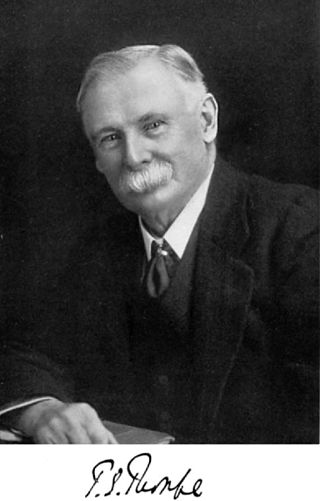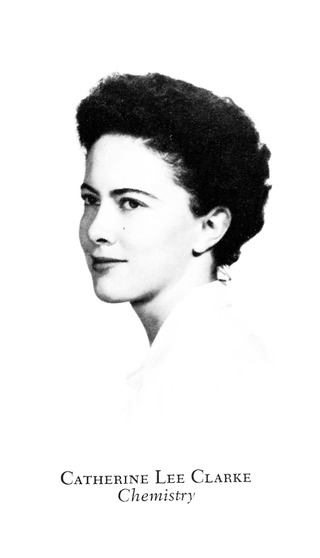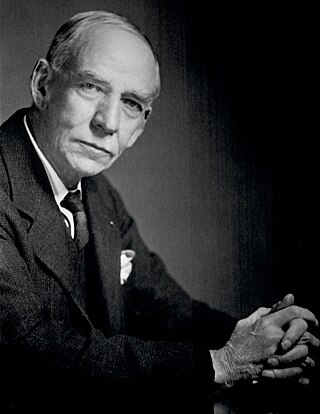
Harvey Washington Wiley was an American chemist who advocated successfully for the passage of the landmark Pure Food and Drug Act of 1906 and subsequently worked at the Good Housekeeping Institute laboratories. He was the first commissioner of the United States Food and Drug Administration.
The American Psychiatric Association (APA) is the main professional organization of psychiatrists and trainee psychiatrists in the United States, and the largest psychiatric organization in the world. It has more than 38,000 members who are involved in psychiatric practice, research, and academia representing a diverse population of patients in more than 100 countries. The association publishes various journals and pamphlets, as well as the Diagnostic and Statistical Manual of Mental Disorders (DSM). The DSM codifies psychiatric conditions and is used mostly in the United States as a guide for diagnosing mental disorders.

The American Chemical Society (ACS) is a scientific society based in the United States that supports scientific inquiry in the field of chemistry. Founded in 1876 at New York University, the ACS currently has more than 155,000 members at all degree levels and in all fields of chemistry, chemical engineering, and related fields. It is one of the world's largest scientific societies by membership. The ACS is a 501(c)(3) non-profit organization and holds a congressional charter under Title 36 of the United States Code. Its headquarters are located in Washington, D.C., and it has a large concentration of staff in Columbus, Ohio.

The Royal Society of Chemistry (RSC) is a learned society in the United Kingdom with the goal of "advancing the chemical sciences". It was formed in 1980 from the amalgamation of the Chemical Society, the Royal Institute of Chemistry, the Faraday Society, and the Society for Analytical Chemistry with a new Royal Charter and the dual role of learned society and professional body. At its inception, the Society had a combined membership of 34,000 in the UK and a further 8,000 abroad. The headquarters of the Society are at Burlington House, Piccadilly, London. It also has offices in Thomas Graham House in Cambridge where RSC Publishing is based. The Society has offices in the United States, on the campuses of The University of Pennsylvania and Drexel University, at the University City Science Center in Philadelphia, Pennsylvania, in both Beijing and Shanghai, China and in Bangalore, India.

The Honorable DrJohn Macadam, was a Scottish-Australian chemist, medical teacher, Australian politician and cabinet minister, and honorary secretary of the Burke and Wills expedition. The genus Macadamia was named after him in 1857. He died at sea, on a voyage from Australia to New Zealand, aged 38.

Analyst is a biweekly peer-reviewed scientific journal covering all aspects of analytical chemistry, bioanalysis, and detection science. It is published by the Royal Society of Chemistry and the editor-in-chief is Norman Dovichi. The journal was established in 1877 by the Society for Analytical Chemistry.
Public Analysts are scientists in the British Isles whose principal task is to ensure the safety and correct description of food by testing for compliance with legislation. Most Public Analysts are also Agricultural Analysts who carry out similar work on animal feedingstuffs and fertilisers. Nowadays this includes checking that the food labelling is accurate. They also test drinking water, and may carry out chemical and biological tests on other consumer products. While much of the work is done by other scientists and technicians in the laboratory, the Public Analyst has legal responsibility for the accuracy of the work and the validity of any opinion expressed on the results reported. The UK-based Association of Public Analysts includes members with similar roles if different titles in other countries.
ChemSpider is a freely accessible online database of chemicals owned by the Royal Society of Chemistry. It contains information on more than 100 million molecules from over 270 data sources, each of them receiving a unique identifier called ChemSpider Identifier.

Sir Thomas Edward Thorpe CB, FRS HFRSE LLD was a British chemist. From 1894 to 1909 he was Chief Chemist to the British Government, as Director of the Government Laboratory.
Muriel Emma Bell was a New Zealand nutritionist and medical researcher.

Catherine Clarke Fenselau is an American scientist who was the first trained mass spectrometrist on the faculty of an American medical school; she joined Johns Hopkins School of Medicine in 1968. She specializes in biomedical applications of mass spectrometry. She has been recognized as an outstanding scientist in the field of bioanalytical chemistry because of her work using mass spectrometry to study biomolecules.
The Association of Greek Chemists is the chemical society of Greek chemists. The Association of Greek Chemists is a public legal entity that reports to the Ministry of Industry, Energy and Technology.
Watney Elizabeth Moran, known as Liz Moran FRSC, is a public analyst, and leads the Business Assurance Division in the UK for SGS.
Elizabeth Anne Howlett Hall CBE, CChem, FRSC is a British Professor of Analytical Biotechnology at the Institute of Biotechnology, Department of Chemical Engineering and Biotechnology at the University of Cambridge.
Valerie Belton, commonly known as Val Belton, is a retired professor of management science at University of Strathclyde. She is a researcher who has worked on the design and application of multi-criteria decision making (MCDM) approaches for over 30 years. She co-authored a book on this field Multicriteria Decision Analysis: An Integrated Approach, that was released in 2002. She has attempted to incorporate multi-criteria decision analysis with problem structuring techniques, system dynamics, and other analytical approaches. She has a number of scholarly articles to her name and served as the editor of the journal Multi-Criteria Decision Analysis.
Mary Andross (1893-1968) was a Scottish food chemist and one of the leading pioneers of dietetics.
Robert Tatlock Thomson FRSE FRIC (1856–1950) was a 19th/20th century British chemist and public analyst. In 1908 he was involved in the first legal definition of Scotch whisky.
Karen Jane Faulds is a Scottish academic and Professor of Analytical Chemistry at the University of Strathclyde. She develops surface-enhanced Raman spectroscopy (SERS) for bioanalysis, and has won several awards for her research, including the Coblentz Society Craver Award.

John Thomas Dunn was an English analytical chemist. He was also a teacher and author. He became President of the Royal Society of Chemistry and received the highest honours his scientific colleagues could bestow.
James Emerson Reynolds was an Irish chemist who was the first scientist to isolate thiourea and developed the "Reynolds's test" for acetone.








